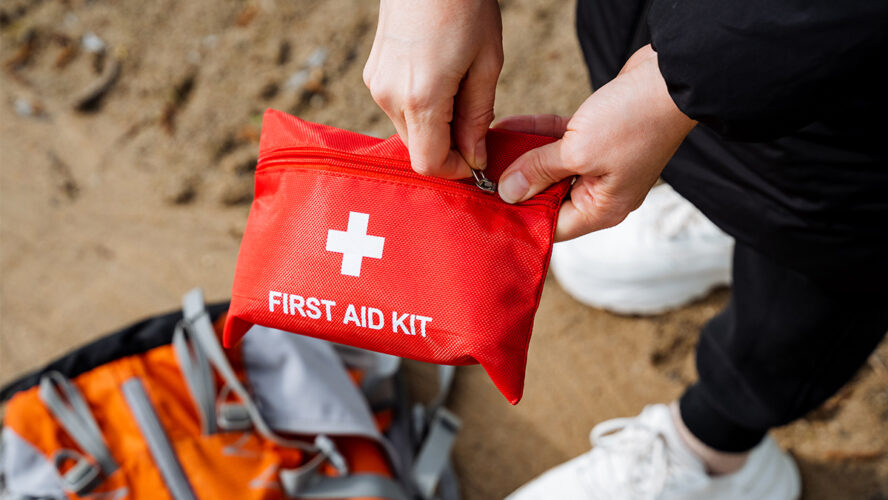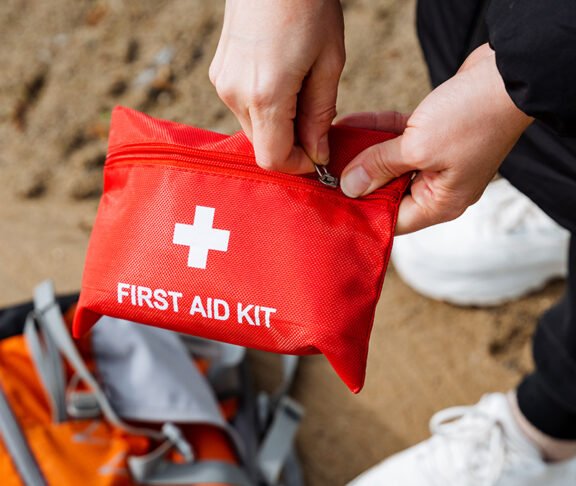Disaster response nonprofit Team Rubicon shares its top tips for surviving and recovering from any disaster.
Hurricanes to wildfires, Americans are increasingly being exposed to major disasters. According to New York University’s Rebuild by Design at the Institute for Public Knowledge, 99.5% of congressional districts include a county that received a major disaster declaration for extreme weather between 2011 and 2024.
With more people than ever living in disaster-prone areas, the best way to survive a disaster is to prepare for it. Disaster response nonprofit Team Rubicon’s budget-friendly ways to prepare for an emergency can improve your chances of surviving a severe storm and help you recover more quickly after one.
Build a disaster kit
Having an emergency kit that you can grab and go if you’re evacuating in advance of wildfires or relying on in the days after a tornado is essential. Your kit should contain:
- Water: At least 1 gallon per person per day for three days. Pro tip: sanitize and reuse juice bottles for water storage — it’s cost-effective and eco-friendly. Be sure to label each container with the filling date and the words “drinking water,” store them in a cool place out of direct sunlight, and replace the bottles six months after filling.
- Non-perishable food: Every time you head to the grocery store, pick up a few on-sale non-perishable foodstuffs to add to your stockpile. Canned goods, peanut butter, and dried fruits last the longest, but make sure to check expiration dates regularly. Those who shop at food pantries or food banks should consider picking up additional canned and shelf-stable items during their regular visits.
- Manual can opener and matches: Don’t overlook these small tools. There’s no point in storing cans you can’t open.
- First-aid kit: Include antiseptics, gauze, tape, scissors, pain relievers, and essential personal medications.
- Flashlights and batteries: Keep several flashlights and a fresh supply of batteries on hand. Headlamps are also great for hands-free lighting.
- A multi-tool: A compact multitool with a knife, pliers, screwdrivers, and scissors can serve dozens of emergency uses.
- Three days’ worth of medication: Create a cache of prescriptions for each family member. Most health insurance providers offer a one-week “vacation prescription” to their patients at no additional charge, but if your insurance doesn’t cover such supplies, discount methods like GoodRx or Cost Plus Drugs can help you stock up without breaking the bank. Make sure to rotate your stock, using the oldest medications first to prevent expiration.
- Pet food and supplies: You should also build an emergency kit for your pets.
- Disaster-proof essential documentation: Store valuables, like insurance documents, family heirlooms, irreplaceable photos, and home deeds in a waterproof container. A plastic bin with a locking lid is an excellent choice, but in a pinch, sealing documents in Ziploc bags and placing important documents and memorabilia high on a shelf so that if a flood does occur, they won’t get soaked also works.
Manage yard debris ASAP
Don’t let objects in your yard pile up and turn into projectiles or fire tinder. Actively remove vegetative debris in the yard and stow or secure toys, lightweight furniture, and other objects that could become airborne in high winds. Need help with the heavy lifting? Ask a local high school sports team to spend a day volunteering in your neighborhood. Removing debris this way protects your home and your entire community.
Make a plan for cooking without gas or electricity
Disasters often result in days or months of power outages. Prepare to grill — outside in well-ventilated places — after a storm. Put extra charcoal, lighter fluid, and lighters in a plastic container to keep them dry or keep at least one extra tank full of propane on hand at all times.
Ahead of any disaster season, preparation is paramount. Even if you think a disaster could never happen in your area, these cheap and easy disaster preparation efforts will allow you to hope for the best but prepare for the worst.

